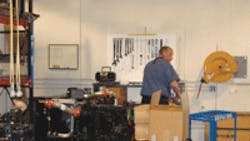By now, probably hundreds of books have been written about lean manufacturing, and the number of consultants who focus their practices on lean reaches double digits, if not higher.
While both sources provide a good foundation of learning, there's an argument to be made that the best way to learn about lean is to see it in action and share with others who are going down a similar path.
So suggests Shane Marshall, a business development manager at Livingston & Haven in Charlotte, N.C., and steering committee member of the Metrolina Lean Alliance. Books and consultants have been part of the company's lean experience, but "you really learn the most by sharing with other people going through it," Marshall says. "[The alliance] is almost an extra group of employees who have been through it."
The Metrolina Lean Alliance is a member-based group of organizations located in the Rock Hill, S.C.-Charlotte, N.C., region. Organization members share ideas about lean with each other during monthly meetings at rotating facilities, with the host location demonstrating its lean efforts under way. The Metrolina alliance is one of seven South Carolina lean alliances sponsored by that state's Manufacturing Extension Partnership. Alliance members pay annual dues.
Alliance members typically are not all at the same point in their lean efforts. While some may be textbook lean organizations, others are not. That's a good thing, Marshall suggests.
"The variety of lean experiences makes us feel not alone in our struggles," he says. It also demonstrates that lean "is not something you can do overnight."
Livingston & Haven joined the Metrolina Lean Alliance in 2007. "For us it was another avenue to learn as much as we could about lean," Marshall says.
Manufacturers aren't the only members of the alliance. Indeed, while Livingston & Haven offers custom-engineered solutions, it also is a distributor and even has two retail outlets. The Metrolina Lean Alliance includes such manufacturers as Timken and Wikoff Color Corp., but it also includes State Farm's East Coast distribution warehouse.
Learning from State Farm
There's plenty for manufacturers to learn from State Farm, says Chris Klasing, JCK Associates, who facilitates the South Carolina alliances. Klasing is a retired manufacturer whose interest in lean dates back to the 1990s ("when it wasn't as well known as it is today," he notes) and helped spur the development of the alliances.
Manufacturers typically aren't very good at running warehouses, Klasing says. State Farm's participation in the Metrolina alliance provides its manufacturing members with insights into warehousing. By the same token, such lean tools as 5S and Total Productive Maintenance have warehouse applications.
"[Lean] is process improvement, and there's a process behind everything," adds Marshall.
Livingston & Haven has hosted two Metrolina Lean Alliance events in the past several years and is slated to host another shortly. Marshall says at that event the company is likely to share with alliance members its value-stream-mapping effort of its retail stores' order entry process.
While it's retail-oriented, the process involves product, customers, order, assembly and collection, Marshall points out. "I think it can be related to the whole value stream. All the components are there," he says.
For Livingston & Haven, among the most beneficial ideas it has incorporated as a result of its alliance association is the daily morning meeting, Marshall says. Metrics from the previous day are reviewed during those meetings, which are cross-functional in nature to acknowledge challenges that span multiple parts of the value stream
"It's brought big improvements," he says.
Sharing lean experiences with other companies delivers multiple benefits, Klasing believes. While an organization can learn a lot from benchmarking across its own enterprise, "to a degree [they] all drank the same Kool-Aid," he says. Looking outside for inspiration provides an opportunity to learn from other plants' paradigms.
The South Carolina alliances also give continuous improvement professionals opportunities to network with their peers, "which is something you don't always get," Klasing says.
About the Author
Jill Jusko
Bio: Jill Jusko is executive editor for IndustryWeek. She has been writing about manufacturing operations leadership for more than 20 years. Her coverage spotlights companies that are in pursuit of world-class results in quality, productivity, cost and other benchmarks by implementing the latest continuous improvement and lean/Six-Sigma strategies. Jill also coordinates IndustryWeek’s Best Plants Awards Program, which annually salutes the leading manufacturing facilities in North America.
Have a story idea? Send it to [email protected].

